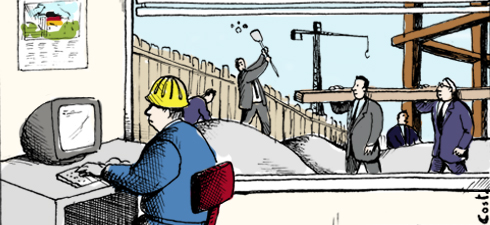“Theo wir fahr'n nach Lodz”, went a popular German song, written in the 19th century, during a period of intense industrialisation of the Calisia-Masovia area. For Germans, the city of Łódź seemed like an eldorado. Here they saw opportunities for a better future, here they amassed their fortunes. The Scheiblers from Rhineland, the Herbsts or Geyers from Saxony. Well, it looks like history likes to repeat itself.
After the cataclysms of two world wars and the communist collapse, are we again seeing a new wave of German immigrants in Poland? While this is hardly an exodus yet, Poland has become one of the favourite places where Germans relocate permanently. In 2006, Poland ranked fifth among such countries, and today more Germans settle in Poland than in Spain or France. According to the Federal Statistical Office (Destatis), 9,434 German passport holders settled in Poland only last year, making Poland the third most popular destination for Germans relocating abroad, now ahead of Austria and behind only Switzerland and the United States.
Germans on the road
Only a couple of years ago the traffic went in the opposite direction. Until the collapse of communism and the democratic changes in Poland, West Germany was a dream land for Polish emigrants, who, having dug out photos of distant relatives who had been drafted into the Wehrmacht, applied for a German passport or at least the residence permit, or Aufenthaltsbewilligung.
Today, despite various official incentives, free language courses, vocational training, and special bonuses offered by some companies, relatively few Poles are interested in working in Germany.
The roles have now reversed and it is Poland that thousands of German citizens today perceive as an attractive place for pursuing a career or taking up residence. Nearly six thousand German businesses operate in Poland today, most of them small or medium-sized, but major corporations too. Overall German investment in Poland has so far reached some 22 billion euros, and last year German companies accounted for 21 percent of all foreign direct investment in the country.
Only a few years ago, when someone in Germany said they were going to work in Poland, the usual reaction was one of astonishment. Today no one in Germany finds this strange. For unemployed Germans, especially from the former DDR, Poland represents an opportunity for getting a permanent job, and for young graduates it offers the prospect of a faster career track and being entrusted with more ambitious and responsible tasks.
Bartłomiej Sochański, former mayor of Szczecin and German honorary consul there since 2001, estimates the number of German gastarbeiters in his region – plumbers, carpenters, bricklayers, roofers – at 2,500, most of them arrived from the high-unemployment states of Brandenburg and Mecklenburg-Vorpommern. Many have settled on the Polish side of the border and have no intention of returning to Germany.
It is not only the prospect of getting a job, advancing professionally or doing good business that attracts Germans to Poland, but also nostalgia for one’s native country or simply the landschaft. Dr Gotthard Sinapius has chosen the village of Lekowo near Świdwin in the Zachodniopomorskie province in north-eastern Poland. A 58-year-old cultural-heritage conservator, he co-owns a manor house there, or rather what remains of the late 17th-century structure. Dr Sinapius refuses to discuss the costs of renovation, saying only they were covered by his relatives from all over the world. He still has a lot of work to do here, but guest rooms, a large dining room with a fireplace and a room where chamber orchestra concerts take place three times a year are ready.
The horses are waiting
Steffen Möller, a stand-up comedian and actor, best known in Poland for his role in the M jak miłość soap opera, Poland’s self-proclaimed “ambassador” in Germany and author of the best-selling book Viva Polonia: als deutscher Gastarbeiter in Polen (2008), humorously instructs his compatriots during his stand-up comedy tours on how to live in Poland. “Some of you will have to throw their favourite stereotypes away tonight”, he begins. “Poland is, after all, the third most popular relocation destination for Germans”. His latest book, Expedition zu den Polen, remained for many weeks on German bestseller charts. In fact, more and more practical how-to guides for prospective emigrants are being published in Germany, instructing them about Polish business, labour or tax regulations.
“Diese verdammte Nest, gibt mir den Rest / Ich fühl mich zu jung für Mist und Dunk – Ich brauch' Musik und Tanz und etwas Eleganz / Gib Dir einen Stoß und dann geht's los / Theo, wir fahr'n nach Lodz” [The damn hole, give me a break / I’m too young for all this crap – I need music and dance and some elegance / Pull yourself together and let’s go / Theo, we’re going to Lodz] – the song, once popular all over Europe and even in the US, became a big hit in Germany in 1974 when recorded by the Greek German singer Vicky Leandros.
Earlier, in the 19th century, the song was sung by many, including soldiers in the Austro-Hungarian army to ironic lyrics written by Fritz Löhner Beda, an Austrian Jew who was murdered in the Auschwitz concentration camp in 1942. Will present-day German emigrants find their “promised land” in Poland? Whatever may be the case, the horses, as the song says, are “already waiting”.
Was this article useful? If so we are delighted!
It is freely available because we believe that the right to free and independent information is essential for democracy. But this right is not guaranteed forever, and independence comes at a cost. We need your support in order to continue publishing independent, multilingual news for all Europeans.
Discover our subscription offers and their exclusive benefits and become a member of our community now!












